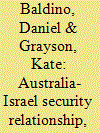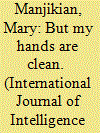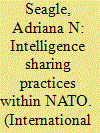|
|
|
Sort Order |
|
|
|
Items / Page
|
|
|
|
|
|
|
| Srl | Item |
| 1 |
ID:
175656


|
|
|
|
|
| Summary/Abstract |
While the Australia-Israeli relationship encompasses a cordial bilateral comradeship, it has not been without diplomatic skirmishes that have tested its reputation and strength. In particular, controversial intelligence liaisons coupled with recurring security-related scandals pose significant risks and challenges to Australian national interests. This article will explore the rationale, execution and hazards of the Australia-Israel intelligence relationship from an Australian perspective. When dealing with intelligence exchange across nations and information sharing with allies that might entail both formal and informal arrangements, it is argued that transparency and secrecy can co-exist when reconciled through robust, independent and well-resourced national oversight institutions. In an era of expanding globalisation of intelligence, targeted accountability advances that are adaptive to global trends may serve to mitigate the potential costs and downsides of transnational intelligence exchange while respecting the rights and liberties of citizens and ensuring that sovereignty, human rights standards and rule of law remain protected.
|
|
|
|
|
|
|
|
|
|
|
|
|
|
|
|
| 2 |
ID:
140993


|
|
|
|
|
| Summary/Abstract |
Post-11 September 2001 (9/11) intelligence sharing has become more important than ever. Sharing arrangements have proliferated, involving additional types of organizations on all levels (local, state, national, and international), and more participants, including those from non-democratic regimes. The fight against terror has brought many new players together for the first time, united in combat against a common enemy. But since intelligence sharing arrangements are often informal and ad hoc, clear guidelines or common ground are seldom available in determining the rules governing such arrangements in the absence of shared norms and values on issues, including human rights, accountability, and transparency. That new controversies have arisen in the area of intelligence sharing is thus not surprising. Three specific ethical dilemmas involving intelligence sharing, have developed, among others, in recent years:
|
|
|
|
|
|
|
|
|
|
|
|
|
|
|
|
| 3 |
ID:
149469


|
|
|
|
|
| Summary/Abstract |
What explains variation in the depth of intelligence sharing? Realism provides the standard answer: shared threat motivates deeper cooperation. In a recent article, Ryan Bock offers a liberal antidote to this conventional view, leveraging insights on domestic regime type to explain why Anglo-Soviet sharing remained shallow despite the German threat during 1941–5. Several shortcomings in Bock’s innovative study undermine his main arguments and findings. A reevaluation of the Anglo-Soviet case and a cursory examination of nine other intelligence-sharing relationships during the Second World War reveal a spread of variation in the depth of cooperation that cannot be explained by a liberal regime-type argument, a realist threat perspective, or other prevailing International Relations paradigms. Marrying insights from interdisciplinary scholarship on gossip and embedded exchange, we propose a novel alternative framework that suggests plausible solutions to puzzles left behind by other accounts, thus opening a new line of inquiry for future research on intelligence cooperation.
|
|
|
|
|
|
|
|
|
|
|
|
|
|
|
|
| 4 |
ID:
165319


|
|
|
|
|
| Summary/Abstract |
When and why do friendly states deliberately share and unwittingly accept fabricated intelligence about others? Recent work on the interpersonal foundations of security cooperation suggests intelligence liaison is a type of embedded relationship that requires a dependable route for exchange (close personal ties) and a consistent record of exchange (reliably meeting expectations). We extend this argument to show that the relational embeddedness underpinning truthful intelligence liaison also explains the sharing of fabricated intelligence. We argue that intimate personal relations and a history of reliable exchange create a channel for effectively transmitting false information, for the recipient is unlikely to challenge its authenticity, and that violated cooperative expectations provide a reason for attempting to deceive a partner. Drawing on extensive archival research, we evaluate our theory by analyzing Britain's decision to share fabricated intelligence about Germany with the United States in 1941.
|
|
|
|
|
|
|
|
|
|
|
|
|
|
|
|
| 5 |
ID:
139512


|
|
|
|
|
| Summary/Abstract |
The evolution of intelligence sharing within the North Atlantic Treaty Organization (NATO) reveals periods of tension, relaxation, and intense cooperation. Historically, the relationship among the United States, France, and the United Kingdom regarding intelligence sharing, especially during the Cold War, has not been one of trust and mutual cooperation. The mistrust of NATO's allies in the American deterrent strategy related not to Washington's willingness to keep its commitment to defend Europeans, but rather to the idea that in an event involving nuclear weapons “an American politician would never exchange the survival of Detroit for that of Paris.”
|
|
|
|
|
|
|
|
|
|
|
|
|
|
|
|
| 6 |
ID:
144802


|
|
|
|
|
| Summary/Abstract |
Intelligence about transnational terrorism is generally gathered by national agencies. I set up and analyze a game-theoretic model to study the implications of national intelligence gathering for the provision of domestic (defensive) counterterrorism when two countries are facing a common transnational terrorist threat. It is shown that, relative to a benchmark case where all intelligence is known by both countries, national intelligence gathering often leads to increased inefficiencies in counterterrorism provision. By extending the main model with a communication stage, I also explore whether the differences in information that may follow from national intelligence gathering will be overcome by intelligence sharing. If verifiable sharing is a viable option for each country, then full credible intelligence sharing can happen in equilibrium. On the other hand, if only cheap talk communication is possible, then it cannot.
|
|
|
|
|
|
|
|
|
|
|
|
|
|
|
|
|
|
|
|
|